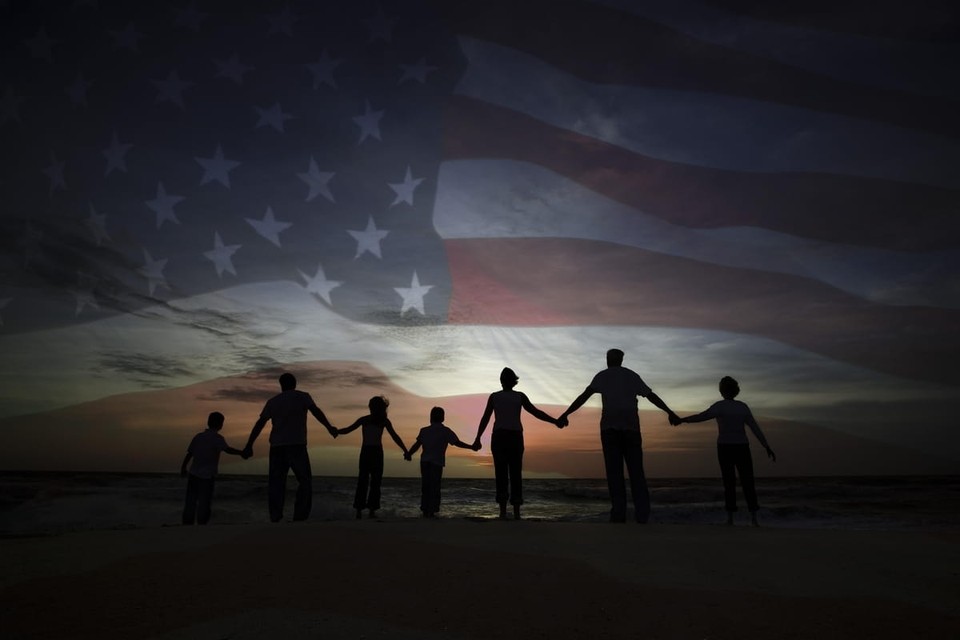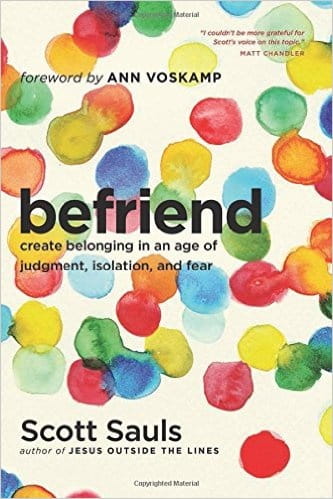Rejecting Fear in the Divided States of America

If anything, Sunday’s presidential debate revealed the unstable nature of our current cultural moment. A quick glance at the news or the average social media feed reveals an undercurrent of outrage. Anger and disdain is apparent in many places, including what many believe is the most polarizing, bizarre presidential election cycle that we’ve ever experienced.
The Republican candidate is a billionaire business tycoon who not only insults women, but has boasted about using his power to exploit women sexually. He has a history of supporting and profiting from the pornography industry, calls his opponents “losers,” makes fun of people with disabilities, boasts about his extramarital affairs and the size of his private parts, admits to never having confessed a sin to God, shows little compassion for war-torn and terrorized refugees, talks flippantly about the “virtues” of torture tactics and threatens to kill the families of his enemies.
The Democratic candidate, if elected, will consider it her personal mission to make abortion rights more accessible and celebrated than ever. She has made public statements that threaten the viability of faith-based institutions that, for reasons of conscience, are unable to embrace a secular progressive vision for sexuality inside their organizations. Should her wishes become reality and be codified into law, it could lead to loss of resources, community and place for many faith groups, including Jewish, Muslim, and Christian-led organizations. In the name of tolerance, certain historic and biblical views would be labeled intolerable. In the name of equality, those holding these views would no longer receive equal treatment under the law. According to one Washington insider, things would become “very tough on religious freedom” for faith-based leaders and organizations under her presidency.
In such a climate, Christian leaders must ask several questions: How can we lead in a climate that seems increasingly opposed to historic Christian beliefs, and that even, in some instances, treats Christian beliefs as evil? How can we promote certain virtues, such as the sanctity of all human life (the unborn and those who are disabled, the elderly, the poor, immigrants and refugees etc.), when those potentially in power, regardless of their party, have explicit agendas to diminish the dignity and flourishing of certain forms of human life? How can we be faithful, cooperative, life-giving citizens of earthly kingdoms when those same earthly kingdoms threaten and even promise to punish the very virtues that good citizenship requires?
To these and all related questions, the answers from Scripture are clear: Do not fear, because God is with you, and do not hate, because your true enemy is not visible, but invisible.
It is remarkable to me that the most repeated command in the Bible is “Do not fear.” Christians in particular should not fear because the final chapter of the Story in which we live has already been written. We are told in Revelation of a New Heaven and a New Earth where the old, hostile, chaotic, divided world in which we now live will pass away, and everything will be made new. The reign of Jesus will be fully and finally established, “and the government shall be upon his shoulder…of the increase of his government and of peace there will be no end.” Under his reign, “there will be no more death, mourning, crying or pain,” no suffering or sorrow or disharmony or division, because God will have set his world right again (Isaiah 9:6-7; Revelation 21:1-8). Lambs will be at peace with lions, snakes with scorpions, and liberals with conservatives. All nations and cultures and colors will live as one, and power—all power—will be used only to love and to serve and never to coerce, subdue, control, shame, punish or destroy.
If you are a Christian leader, boss or influencer, a time may come when your faith is costly to you and also to those whom you lead and serve. A time may come when certain organizations get put out of business because faithful Christianity becomes incompatible with the dogma, moral vision, and laws of the land. A time may come when religious freedom gives way to religious persecution for those who stand firm in their commitment to be disciples of Jesus versus disciples of prevailing culture. Perhaps what was true of Christians in ancient Rome, and what is still true of Christians in other parts of the world today, will also someday become true of us—losing our livelihoods, our friends, our families, even our own lives for Jesus’ sake.
Even if these things did occur in our lifetimes, it should not come as a surprise to us because Jesus said that in this world we will have trouble and that people will hate his followers because of him. Jesus said that anyone who remains loyal to him will be persecuted and have false things said about them. He said that if we want to be his followers, we will have to deny ourselves daily, take up a cross, and follow him. The Apostle Paul similarly said, “It has been granted to you on behalf of Christ not only to believe in him, but also to suffer for his sake” and “I want to know Christ, and the power of his resurrection, and the fellowship of sharing in his sufferings, becoming like him in his death.”
If things get worse for Christians in the United States—much worse than they are now—we should not be undone or obsessed about reclaiming “the good old days,” as if the good old days ever really existed. Rather, the Bible’s encouragement not to fear stands true especially in a climate of opposition and persecution. Jesus is with us and is for us, in any and every circumstances. If Paul can declare from a Roman prison cell that through Christ, he was able to be content in every situation, whether facing plenty and abundance, hunger or need, then we can certainly, and in any circumstance, declare the same. Our hope is not anchored in this present world, but in the world to come. Because this is true, our long-term worst case scenario is resurrection and everlasting life, an eternity of perpetual and unending strength, momentum and bliss. The wind will forever be at our backs. It will be a world in which, as CS Lewis has said, every day will be better than the day before. It will also be a world in which, as JRR Tolkein has said, everything sad will come untrue.
So lead on, Christian influencer. Even if things get so bad that you are tempted to throw in the towel, even if your every effort to love, lead, and faithfully serve your neighbors gets squashed, even if the world responds to your love with rejection and resistance, you must continue to love on and to lead on. Even if the world starts feeling to you like a sinking ship, there is good reason to find a piece of brass on the Titanic and start polishing it. For the task of Christian leaders is to remind themselves, and also those whom they lead, that neither death, nor mourning, nor crying, nor pain, nor opposition nor hostility nor persecution nor anything else, gets to dictate the story line in the Story of God, the last chapter of which has been written and published, and that has firmly solidified history’s future.
Pause for a moment and exhale. Then, breathe this in deeply:
If God is for us, who can be against us? He who did not spare his own Son but gave him up for us all, how will he not also with him graciously give us all things? Who shall bring any charge against God’s elect? … Who shall separate us from the love of Christ? Shall tribulation, or distress, or persecution, or famine, or nakedness, or danger, or sword? … No, in all these things we are more than conquerors through him who loved us. For I am sure that neither death nor life, nor angels nor rulers, nor things present nor things to come, nor powers, nor height nor depth, nor anything else in all creation, will be able to separate us from the love of God in Christ Jesus our Lord (Romans 8:31-39).
Do we believe this? Even if we struggle to believe it, it is no less true.
In the end, Jesus wins.
This article originally appeared on ScottSauls.com. Used with permission.

Click here for a free chapter from my latest book, BeFriend.
Publication date: October 21, 2016
Image courtesy: Thinkstockphotos.com
Originally published October 21, 2016.







